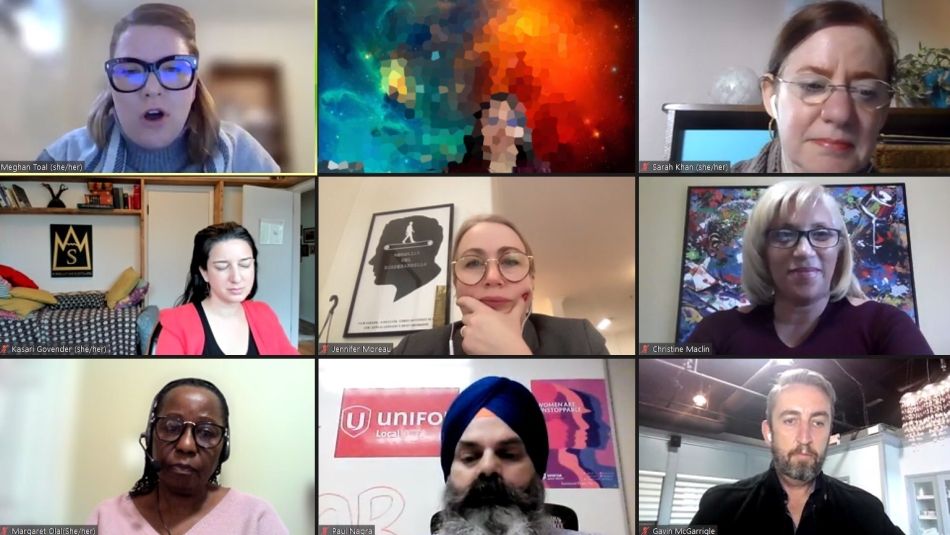
Share
A protester in a truck followed a woman driving her media-branded vehicle homes after covering an anti-mandate protest and endured verbal abuse.
Transit operators were confronted with violence while enforcing rules that all passengers must wear masks onboard.
Guests who refused to follow Covid-19 mandates during their stay harassed hotel workers.
These were some of the disturbing stories Unifor members shared with the British Columbia Office of the Human Rights Commissioner during an online inquiry meeting on March 7, 2022, into incidents of hate during the Covid-19 pandemic.
"When people think about hate, they think about an incident you'd see captured on a video camera, not the systemic ongoing discrimination that means taking food out of people's mouths or taking jobs away or having access to health and welfare," said Unifor Western Regional Director Gavin McGarrigle in his opening remarks.
McGarrigle criticized “the failure of government” to protect recall rights of thousands of hotel workers, who were not protected during the pandemic – many of whom are women, workers of colours and with decades of seniority – even though the government “shovelled money out to business groups.”
The provincial government initiated the inquiry in August 2021 and was a response to significant increase in reported hate-related incidents in B.C., including those online, since the start of the pandemic in 2020.
Jennifer Moreau, Chairperson of Unifor's Media Council, outlined online harassment is often gender-targeted, with many women journalists affected with abuse while on the job.
“Hate against journalists is on the rise,” she explained, pointing to Maxime Bernier calling on his alt-right supporters on Twitter to “play dirty with reporters,” she said.
“[Ex-U.S. President Donald] Trump really opened the door for hostility against media workers. Covid is a flashpoint when you’re covering the pandemic, it’s a flashpoint for online harassment and for covering live events, like anti-vax protests. We know that the harassment is sexist and racist in nature,” Moreau added.
During the pandemic, Unifor B.C. Racial Justice Liaison Margaret Olal cited many Asian-Canadians experienced hate and violence significantly.
“Covid-19 was the trigger, but the underlying issue of discrimination towards Indigenous, Black and people of colour, in general, had been building up for decades,” she said. “My co-workers who are of Asian and South Asian descent, told me they were afraid to go out in the evenings and their elderly parents were afraid to get groceries as a result.”
Paul Nagra, Unifor Local - Vancouver Container Truckers’ Association President, noted during the Delta variant wave, container truck driver often couldn't get a cup of coffee or couldn't access public washrooms while working long hours to get to their destinations.
"During the pandemic, the abuse was amplified,” he said.
Unifor B.C.-Alberta Area Director Andrea MacBride said transit workers face verbal abuse and physical and sexual assaults while on the job and the increases in instances "noticeable" to union members during Covid.
"We see increased sick leaves, workers' compensation claims all due to this hate put on to our members."
Mike McMillan, the Vice-President of Local 111, gave examples of transit riders wanting to get on vehicles without wearing masks that creates confrontation not only between the driver and passenger, but on the back of the bus and with drivers themselves. He said he would like to increases to mental health benefits to help alleviate some of trauma workers feel as a result of coming face-to-face with harassment and violence.
Unifor's Human Rights Director Christine Maclin told the commission that 90% of workplace harassment are not reported. She said, as a union, “we're asking for an expedited process" to address these concerns, for workers to be able to complain anonymously and processes for hate speech. There is a greater need for employers to provide protections for employees, regardless if their workplaces are non-traditional, she added.
“The anonymous hater (online) is becoming all too common, but the hate is equally hurtful and leaves the targets feeling like there is no recourse. Hate speech, hate online, violence and a lot of harm are impacting people in our communities – mostly Black, Indigenous, people of colour, women, people with diverse religions and diverse identities and people living with disabilities,” she said.
“Hate is hate and there is no place for it. Not in our workplaces, society, country or globally.”
Members who face workplace harassment, from the public or from co-workers, are encouraged to reach out to their local union representatives for support, including enforcement of collective agreement protections and mental health support. They can also contact Unifor’s Human Rights department at @email.


